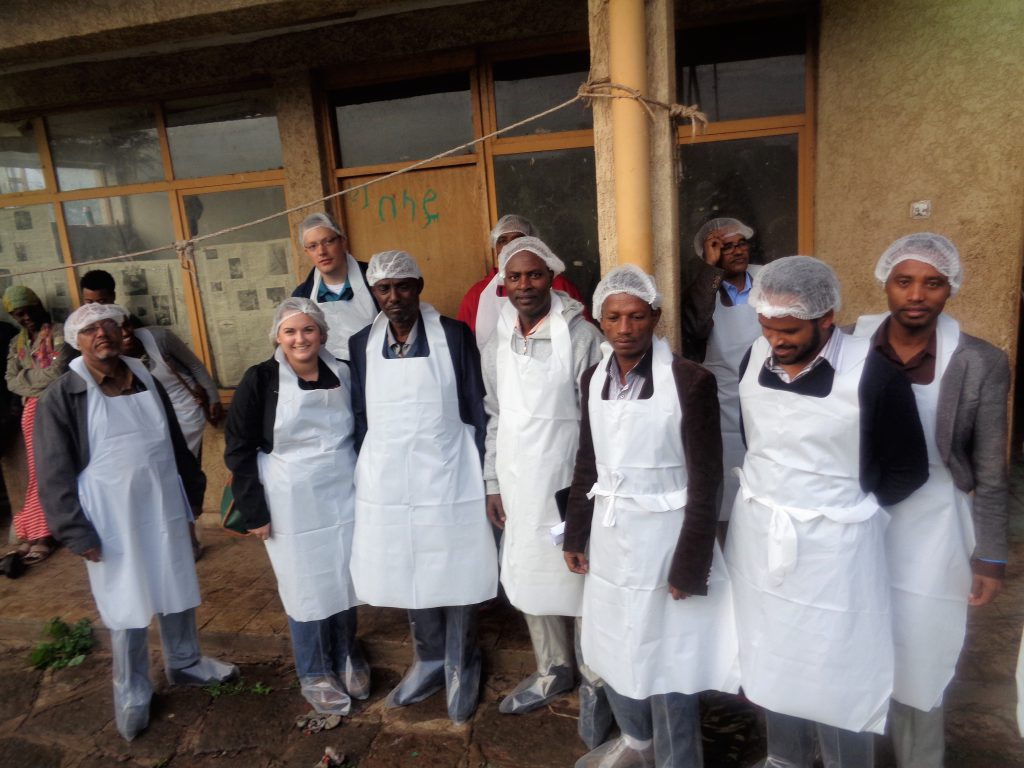On day three of a workshop, participants (from butchers’ associations, abattoirs, and government) witnessed the slaughter of two steers at the Mana Qalmaa Kristaana abattoir in Adama, Ethiopia. They viewed the entire process and discussed it with workers and the inspector. Next, they visited a butcher, and several participants took the initiative to discuss concerns with the owner. At the end of the workshop, some participants pledged to change their personal eating habits based on the new knowledge acquired. The 20 workshop participants (18 men and 2 women) represented a cross-section of the Ethiopian beef supply chain and included officials, veterinarians, and abattoir and butchery workers.

Processing of beef in Ethiopia typically does not include refrigeration. There is also a cultural preference for raw meat and a bias against refrigerated meat, because it is considered inferior. Moreover, the widespread religious practice of regular fasting also limits days when meat and other products of animal origin can be prepared and consumed. These challenges must be considered as Ethiopia implements its livestock master plan that aims to improve the lives of more than two million poor households that own livestock.
Witnessing the challenging conditions at domestic meat processing facilities, this group pledged to support improvements and to share the training they received. They attended a four-day train-the-trainer workshop in October 2017, organized by the Feed the Future Innovation Lab for Livestock Systems, in collaboration with the Ethiopian Meat and Dairy Industry Development Institute and the Feed the Future Ethiopia Value Chain Activity led by Fintrac. Since then, more than 160 Ethiopians (more than 80% of whom were youth) have received similar training and Fintrac plans to scale out the training to about 2000 butchers.
Problematic Conditions
Conditions at domestic abattoirs surprised Dr. Jason Scheffler from the University of Florida, who was conducting a needs assessment of butcher shops and abattoirs in Addis Ababa, the capital. He visited a 50-year-old facility and noticed several shortcomings. The facility’s previous attempts to implement better food safety techniques failed because they slowed down the meat handling process.
Ethiopian butchers and abattoir owners made a compelling request for the training to Dr. Adegbola Adesogan, the director of the Livestock Systems Innovation Lab, during an initial investigative visit to Ethiopia in 2015. In February 2016, stakeholders made it a priority at an Innovation Platform meeting. Scheffler then performed a needs assessment in Ethiopia in October 2016 as part of the Livestock Systems Innovation Lab’s research and capacity building efforts, guided by Dr. Zeleke Mekuriaw, the Innovation Lab’s Regional Coordinator for East Africa, based in Ethiopia. A UF Master’s student mentored by Scheffler, Taylor Langford, co-taught the workshop in 2017. Inspired by this visit, she is developing a new beef jerky with Ethiopian spices to provide a hygienic and a nutrient-dense supplement for Ethiopian diets.

Networks Expand
A positive outcome from the workshop was informal networking by the participants. “They represented a cross section of the supply chain such as government officials, abattoir managers and butchers, and they had never been in the same room at the same time where they could talk about the challenges of different segments,” Scheffler said. This improved understanding will result in better coordination among the various actors that will further expand when more persons are trained.
By the end of the workshop, participants had made presentations about their observations and built an agenda for their own training program. With 100% attendance, they completed two days of studying and two days of practicals. Their strong engagement showed Scheffler that they could serve as both trainers and future auditors of abattoirs and butcher shops.
Scheffler hopes to see the training reach 2,000 people. In the future, he plans to assess the training’s impacts and how much it changed behavior.
 1
1
